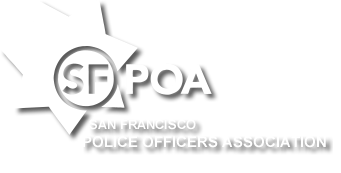During the last POA general election, I was dismayed by a numerical realization. In the initial round of voting, when running against two other candidates, there were more members whose votes indicated that I should be ejected from office than those whose votes indicated that I should remain in their service. After so many years working on behalf of the members, that was not easy to stomach, and it was also more than a little disappointing. While the members did return me to office by a 60-40 margin in the subsequent run-off, that initial vote was still very hard for me to understand -- and it was also very humbling. It validated the old saying that everyone in elected service has a “shelf life,” and when one’s time expires, remaining in office is not a viable option.
One of the great lines about leadership is that a strong and effective leader must learn how to “disappoint people at an acceptable pace.” I enjoy reading history, and I agree that tremendous learning opportunities arise from the mistakes made by those who precede us.
One of the best examples of the shelf-life theory is how Winston Churchill lost re-election as Prime Minister just months after leading the British people to victory in World War II. If one of the greatest leaders in world history had a shelf life, imagine what that must bode for we more common folks holding obscure union offices, guys who were elected simply hold a small employee group together.
Following WW II, Churchill had an 83% approval rating from the British people, and a few months later, he was defeated at the polls. Despite the gallant leadership he displayed during Britain’s darkest days, he had already been branded as a better “war time” than “Peace time” Prime Minister. “Thanks for everything, Winston, but…”
Churchill’s unraveled political career actually spawned his almost mythical legacy. He is more revered today than at anytime during the war. In life, we are all pretty much judged by our “last game.” No one should expect people to remember all or even most of one’s accomplishments. The proverbial pendulum does indeed swing, and new leaders must
inevitably rise to his or her respective occasions. I actually see that natural succession as a good thing.

What’s wrong with this picture?
Will the passing of the POA baton be a smooth transition, or fumbled due to lack of teamwork and coordination?
The graphic of a baton dropping during a hand-off in a race is how many POA veterans see the future of this organization, and that’s disturbing. Those of us currently active in the leadership of this organization know that there are capable leaders “out there,” but very few active members have indicated any sincere interest – or, if they have, will have any viable chance of -- in stepping up and grabbing the proverbial baton from those of us approaching the end of our leg of the race.
Within the next year or two, this organization is on track to lose much of its most experienced leadership. Because the bylaws do not permit retirees to hold elected office, the POA will soon need a new president (Gary Delagnes) and vice president (Kevin Martin). Also slated to exit soon are the treasurer (Marty Halloran), General Counsel (John Tennant), senior office staffer (Yvonne Huey), Welfare officer (Mike Hebel), legal defense coordinator (Steve Johnson), and the Journal editor and archivist (Ray Shine). There are also several members of the board of directors who are in the last months of their career. The collective experience, knowledge, and skills of these veterans will be lost unless younger and less senior members become active now, and pull in behind to grab the baton. The organization – the team – needs fresh legs if it is to remain a powerful and leading employee organization in San Francisco.
Others will judge the accomplishments of those of us leaving. The passing of time always clarifies the gains and the failures. We have seen many respected leaders in our department – from all ranks and assignments -- retire over the past years, and many more will soon be leaving. By June of this year, as many as nine captains will have retired. But, it will be the loss of our senior patrol officers and sergeants that will be missed most, as they are the leaders who directly affect the younger and less senior officers.
There will be many opportunities to promote over the next 4 to 5 years, and it is incumbent that younger officers not only embrace those opportunities, but to also be prepared for the challenges inherent therein. Relatively speaking, it is easy to take a test and pass. It’s not so easy, however, to effectively lead the men and women of this department and gain their respect in so doing. It is even more difficult to do so as a leader of this association.
There are no more important functions in this department than those of the POA leadership. In order to function properly and effectively, union leaders cannot operate entirely within the parameters of political correctness or expediency. When the time comes, one must have the courage to stand firm against a chief, a district supervisor, a mayor, or public opinion. One of the greatest labor leaders of all-time was a Chicago native by the name of Saul Alinsky. He was a social activist in the 30’s fighting for the rights of workers. Alinsky’s credo was, “Change comes from power; and power comes from organization.” Each time the POA endorses a political candidate, or attacks a politician, or takes-on the powers-that-be, we are adhering to that credo.
For better or for worse, my leadership style is bold and aggressive. I feel I have been emboldened by the power that has come from this organization, and we have been incredibly successful. I cannot worry about making enemies in my drive to make your career and your life better. That has at times gotten me in trouble, but the respect of the membership will always be the most important thing for me.
As I move closer to the sunset along with another 400 or so cops over the next few years, I hope our young members are up to the challenges of leading this department and this organization, and even more so I hope they understand the importance of this union and how to maintain that power and respect so vital to any labor organization. I assure you that without strong union leadership, the SFPD will not remain the best place to work in law enforcement.

